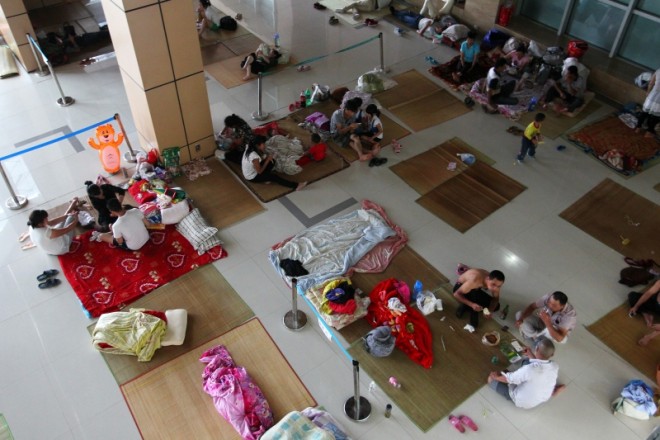Typhoon which hit PH nears China; over 865,000 evacuated

Chinese evacuees rest in a shelter facility ahead of the landfall Typhoon Chan-Hom in Leqing in eastern China’s Zhejiang province Friday, July 10, 2015. Chinese authorities have evacuated tens of thousands of people, canceled scores of trains and flights and shuttered seaside resorts as a super-typhoon with wind gusts up to 200 kilometers per hour (125 mph) heads toward the southeastern coast. (Chinatopix Via AP)
SHANGHAI—Supertyphoon “Chan-hom” (known as “Falcon” in the Philippines) barreled towards eastern China near commercial hub Shanghai on Saturday, prompting the evacuation of more than 865,000 people after earlier lashing Japan’s Okinawa island chain and Taiwan.
The powerful storm could be the strongest typhoon to make landfall in Zhejiang province, which borders Shanghai to the south, for the month of July since 1949, China’s National Meteorological Centre (NMC) said.
At 9:00 am (0100 GMT) on Saturday, the typhoon was around 115 kilometers (71 miles) southeast of Zhejiang province over the East China Sea packing winds of up to 187 km per hour, the NMC said.
It was forecast to make landfall in Zhejiang on Saturday in the afternoon, striking near the port city of Ningbo before approaching Shanghai.
In addition to the large-scale evacuations, the province had called nearly 30,000 fishing boats back to port after waves reached up to 10 metres (33 feet) high off the coast, the official Xinhua news agency reported.
Article continues after this advertisementLocal television showed heavy rain and wind lashing the coastal province under grey skies.
Article continues after this advertisementThe storm left five people dead in the Philippines earlier in the week and injured more than 20 people in Japan on Friday as strong winds uprooted trees and battered buildings, the Tokyo Broadcasting System broadcaster reported.
READ: Death toll rises as ‘Egay’ leaves, ‘Falcon’ lingers
Four people were also injured by falling trees in Taiwan when the storm buffeted the island on Friday.
‘Not bad so far’
Shanghai had issued the second most serious typhoon alert, according to the local government, but had so far ruled out a direct hit on the city of 23 million. Chan-hom was around 370 km from Shanghai on Saturday morning, local television said.
The city government urged people to stay home, as the weather disrupted scores of flights, trains and buses from Shanghai. China Eastern Airlines and Shanghai Airlines cancelled around 400 flights on Saturday, state media said.
Traffic had thinned on the streets, though some people on motorcycles and even bicycles braved the rain, which blew down small branches.
“It’s not bad so far. We’ll stay open even if there is one customer,” said one seller at a small stand offering traditional breakfast food like fried dough.
The typhoon was forecast to affect a wide swathe of China, also bringing heavy rain to the eastern provinces of Fujian and Jiangsu, the NMC said.
“The upcoming typhoon seems very powerful. We have sealed all our windows and doors and have stored food,” said Liu Yimin, a villager in coastal Huagang village, according to Xinhua.
People in coastal fishing farms in Fujian, south of Zhejiang, were also asked to evacuate Friday morning when the NMC first issued a red alert — the highest level — for the super typhoon.
The typhoon is the second storm to hit China in days after severe tropical storm Linfa made landfall on the coast of southern Guangdong province.
The US government’s Joint Typhoon Warning Center forecast Chan-hom would head towards the Korean peninsula, bringing “gale-force” winds to along the west coast of South Korea after hitting China.